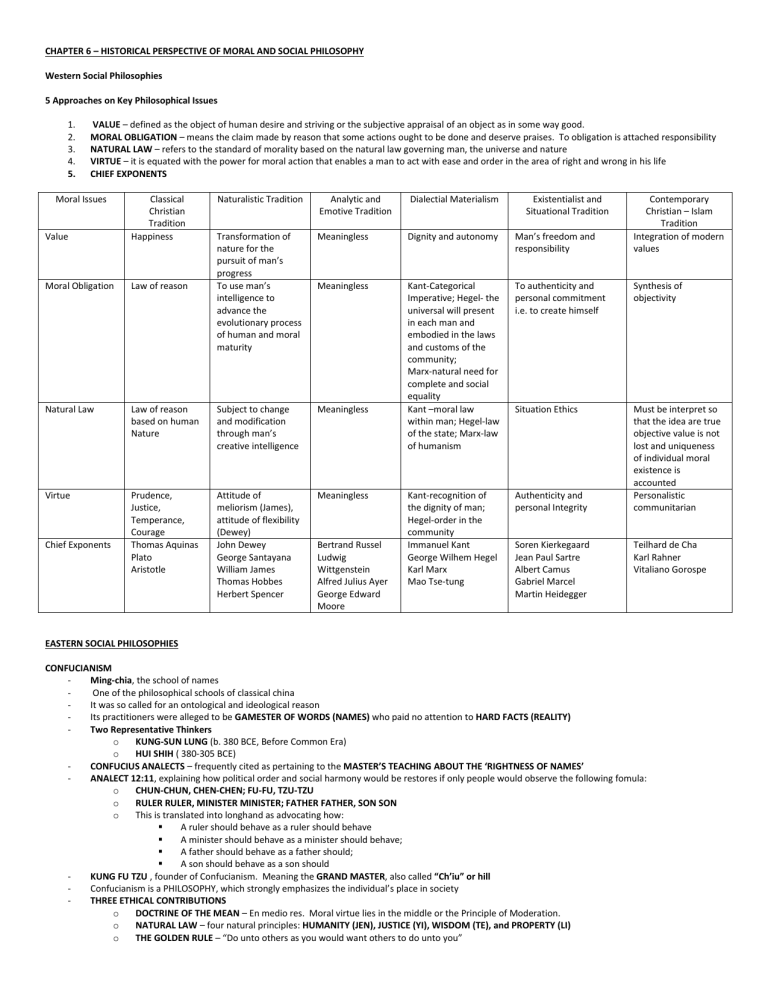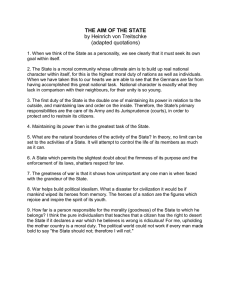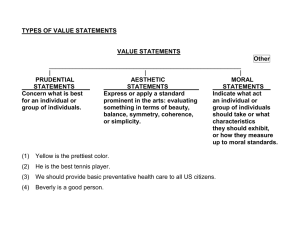
CHAPTER 6 – HISTORICAL PERSPECTIVE OF MORAL AND SOCIAL PHILOSOPHY Western Social Philosophies 5 Approaches on Key Philosophical Issues 1. 2. 3. 4. 5. VALUE – defined as the object of human desire and striving or the subjective appraisal of an object as in some way good. MORAL OBLIGATION – means the claim made by reason that some actions ought to be done and deserve praises. To obligation is attached responsibility NATURAL LAW – refers to the standard of morality based on the natural law governing man, the universe and nature VIRTUE – it is equated with the power for moral action that enables a man to act with ease and order in the area of right and wrong in his life CHIEF EXPONENTS Moral Issues Value Classical Christian Tradition Happiness Moral Obligation Law of reason Natural Law Law of reason based on human Nature Subject to change and modification through man’s creative intelligence Meaningless Virtue Prudence, Justice, Temperance, Courage Thomas Aquinas Plato Aristotle Attitude of meliorism (James), attitude of flexibility (Dewey) John Dewey George Santayana William James Thomas Hobbes Herbert Spencer Meaningless Chief Exponents Naturalistic Tradition Analytic and Emotive Tradition Dialectial Materialism Transformation of nature for the pursuit of man’s progress To use man’s intelligence to advance the evolutionary process of human and moral maturity Meaningless Dignity and autonomy Man’s freedom and responsibility Meaningless Kant-Categorical Imperative; Hegel- the universal will present in each man and embodied in the laws and customs of the community; Marx-natural need for complete and social equality Kant –moral law within man; Hegel-law of the state; Marx-law of humanism To authenticity and personal commitment i.e. to create himself Synthesis of objectivity Situation Ethics Kant-recognition of the dignity of man; Hegel-order in the community Immanuel Kant George Wilhem Hegel Karl Marx Mao Tse-tung Authenticity and personal Integrity Must be interpret so that the idea are true objective value is not lost and uniqueness of individual moral existence is accounted Personalistic communitarian Bertrand Russel Ludwig Wittgenstein Alfred Julius Ayer George Edward Moore Existentialist and Situational Tradition Soren Kierkegaard Jean Paul Sartre Albert Camus Gabriel Marcel Martin Heidegger Contemporary Christian – Islam Tradition Integration of modern values Teilhard de Cha Karl Rahner Vitaliano Gorospe EASTERN SOCIAL PHILOSOPHIES CONFUCIANISM Ming-chia, the school of names One of the philosophical schools of classical china It was so called for an ontological and ideological reason Its practitioners were alleged to be GAMESTER OF WORDS (NAMES) who paid no attention to HARD FACTS (REALITY) Two Representative Thinkers o KUNG-SUN LUNG (b. 380 BCE, Before Common Era) o HUI SHIH ( 380-305 BCE) CONFUCIUS ANALECTS – frequently cited as pertaining to the MASTER’S TEACHING ABOUT THE ‘RIGHTNESS OF NAMES’ ANALECT 12:11, explaining how political order and social harmony would be restores if only people would observe the following fomula: o CHUN-CHUN, CHEN-CHEN; FU-FU, TZU-TZU o RULER RULER, MINISTER MINISTER; FATHER FATHER, SON SON o This is translated into longhand as advocating how: A ruler should behave as a ruler should behave A minister should behave as a minister should behave; A father should behave as a father should; A son should behave as a son should KUNG FU TZU , founder of Confucianism. Meaning the GRAND MASTER, also called “Ch’iu” or hill Confucianism is a PHILOSOPHY, which strongly emphasizes the individual’s place in society THREE ETHICAL CONTRIBUTIONS o DOCTRINE OF THE MEAN – En medio res. Moral virtue lies in the middle or the Principle of Moderation. o NATURAL LAW – four natural principles: HUMANITY (JEN), JUSTICE (YI), WISDOM (TE), and PROPERTY (LI) o THE GOLDEN RULE – “Do unto others as you would want others to do unto you” - CHIN SAN, importance of moral perfection for the individual LI, of social order for the group WAY TO ATTAIN VIRTUES o Being true to one’s nature (chung) o Applying those principles in relationship with others (shu) CONFUCIANISM AND DEMOCRACY MINZHU, Chinese term for democracy. Combination of two characters: MIN meaning people and ZHU, meaning rule or ruler MINBEN, ‘people as root’. Existed since at least during the Han Dynasty and the idea was promulgated by Confucius. TAOISM - Philosophical system, which strongly emphasizes man’s place in nature LAO TZU, founder of Taoism o Taught that the TAO is most fully revealed in tranquility not through action nor righteous living TAO TE CHING say: “THE WAY (TAO)” that can be walked is not the true and unchanging name” Stresses man’s passive role in nature CHUANG TZU’S VIEW OF THE SOCIAL MAN Composed of TWO TYPES: o ORDINARY MASS OF PEOPLE – the masses are the concrete manifestation of humanity o PERFECT MAN – is its ideal form MASSES OF ORDINARY HUMANITY – result of the differentiation of the TAO. Refers to the original substance of all things in the universe. Composed of a BODY (made of physical elements) and a MIND (made up of Virtue). VIRTUE means the characteristic power and energy that animate and motivate it as its most basic level and the spirit or nous. MICROCOSM, a miniaturized version of the universe that contains all the elements necessary to make up Heaven and Earth. FOUR LIMITS OF HUMAN EXISTENCE o MAN’S INSIGNIFICANT SIZE o BONDAGE o DEATH o DELUSION BUDDHISM Originates from the experience of the misery of life. NIRVANA, or the fading our of suffering Has a morality that is characterized as egocentric and individualistic and gives very little positive value to society Teaches EIGHTFOLD WAY and the FOUR NOBLE TRUTHS FOUR NOBLE TRUTHS o The universal fact of pain and suffering o The origin or cause of suffering o The cessation of suffering o The path, which leads to the cessation of suffering EIGHTFOLD PATH o The right view o The right resolve or aspiration o The right speech o The right action o The right livelihood o The right effort o The right concentration o The right contemplation Ultimate GOAL of the Eightfold Path is NIRVANA, which means “TO BLOW OUT” or “TO EXTINGUISH” BRAHMANISM It is founded on the experience of the DIVINE BEING who is the one beyond all multiplicity. GRANTH SAHIB, the holy book of Brahmanism ATMAN , the Self. Revealed as the “unborn eternal God” in whom both man and nature find their fulfillment ISVARA, the inner Spirit, immanent in nature as Brahman Hindu conception of “ADVAITA” or non-duality is a basic mark of Brahmanism SAT, Hindu name for the GODHEAD AS BEING CHIT, for knowledge BLISS ANANDA The principle of being is expressed in the “MAHAVAKYAS” the “great sayngs” of the UPANISHADS: “I AM BRAHMAN; THOU ART THAT. SANKARA, the greatest philosopher in Hinduism, the experience of the Brahman and of the Atman can be interpreted only in terms of advaita or non duality. Hindu believes in MULTITUDE OF INCANATIONS OR “AVATARAS” ISLAM - Means “complete surrender to God of oneself” MUSLIM means “given to GOD” Is a community, a religion, a way of life, a culture and a civilization. Religion of the book “Qur’an” The PROPHET (MOHAMMED) taught that the following comprise the Muslim Creed: - o There is no divinity outside of God o Mohammed is God’s envoy to teach the truth o There is a resurrection after man’s death o Divine decrees govern good and evil FOUR PROPHETS o Abraham o Moses of Musa o Jesus as Kisa(not as son of God) o Mohammed CHAPTER 7: THE HUMAN PERSON AND HUMAN RIGHTS RIGHT – is the “liberty to do, or to forbear” and is a translation of the Latin word JUS as distinguished from the word law, which comes from the latin LEX. DURA LEX SED LEX – the law is hard but it is the law THE UNIVERSAL DECLARATION OF HUMAN RIGHTS It sought to actualized and concretize a common concern of governments and peoples for universal respect for human rights Fulfills its purpose of being a “moral pendulum” It acts as the conscience of the world THREE INSTRUMENTS o The International Covenant on Economics, Social and Cultural Rights o The International Covenant on Civil and Political Rights o Optional Protocol or a document on Constitutional procedures to provide relief to individuals or people who have exhausted all available domestic remedies and must now make resource to the UN Committee on Human Rights for consideration THE HUMAN RIGHTS ISSUE IN THE PHILIPPLINES Philippines is a signatory country to the International Covenant on Economic, Cultural and Social Rights (adopted by the General Assembly in 1966) and the International Covenant on Civil and Political Rights (adopted also in 1966) February 27, 1986, former Pres. Corazon Aquino ordered the release of all political prisoners, including alleged NPA and CPP leaders February 28, 1986, Philippines ratified the Covenant on Civil and Political Rights as a gesture of solidarity with the worldwide human rights movement March 18, 1896, she also signed EO No. 8, creating the Presidential Commission on Human Rights (PCHR) Pres. Aquino repealed a number of Presidential Decrees issued by former Pres. Marcos, violative of human rights, namely o PD 1404 Amending Article 125 of the Revised Penal Code which authorizes a longer period for the delivery of people arrested for political offenses including rebellion, inciting to sedition and subversion; o PD 1834 – raising the maximum penalty for subversion from life imprisonment to death; o PD 1836 – Empowering the President to issue orders of arrest during the state of emergency, or when the privilege of habeas corpus is suspended o PD 1877 – Empowering the President to issue preventive detention action (PDA) against people believed to have taken part in political offenses; o PD 1877-A – Empowering the President to issue preventive detention action (PDA) against people whose arrest and detention are required by public safety or as a means to quell rebellion THE NATURE OF HUMAN RIGHTS AND THE SELF The International Bill of Human Rights enumerates specific human rights, which demand the respect and protection of the people, governments and ideologies o Freedom of religion o Liberty o Property o The right to life o Freedom of expression and association o Right to work o Free access to education DEFINITION OF RIGHT RIGHT is a MORAL POWER OR CAPACITY TO HAVE, TO POSSESS OR TO REQUIRE SOMETHING – deserving respect – such that it is inherent in the person TYPOLOGY OF HUMAN RIGHTS a. NATURAL AND POSITIVE LAW a. NATURAL LAW – refers to the moral precepts, which are perceived by the sound and matured human reason b. POSITIVE LAW – are made by the act of a legislator RIGHT OF PROPERTY – is the power one has of disposing an object one owns as he desires – to keep, to sell, to plead,, to barter or to give away. o May refer to an object actually owned (right in property) or an object potentially owned (property to property) RIGHT OF JURISDICTION – is the lawful power of a duly constituted authority to govern his subject and to impose laws on them b. Right is ALIENABLE when its posses lawfully gives up a right. It is INALINABLE when the possessor cannot give up a right lawfully. c. Right is PERFECT (JURIDICAL) when it is enforced by law, either natural or positive. It is IMPERFECT (NON-JURIDICAL) when it is based on virtue rather than on justice. ESSENTIAL PROPERTIES OF RIGHTS 1. COACTION – is the capacity of right to forcefully prevent its violation, and to exact redress for unjust violation 2. LIMITATION – is the natural limit or boundary of right, beyond which it cannot be exercised without violating the right of another 3. COLLISSION – is the apparent conflict of rights. In cases of conflict, the right which should prevail to which the other gives way, is that which A) belongs to a higher or more universal order. B) concerned with the graver matter. C) is found upon the stronger title or claim THE SUBJECT OF RIGHT Is a PERSON. Only persons, natural and juridical, possess rights. RIGHT TO LIFE Most basic of rights declared for recognition by the General Assembly of nations This is explicitly stated in several articles of the Universal Declaration and of other legal instruments ratified by the UN o Article 3. Universal Declaration o Article 6. Section 1, Section 3, and Section 4 EXTENSION OF RIGHT TO HUMAN LIFE Two fold duty o To conserve life in integrity and to avoid death o Mutilation and the needless danger to life General principles o Man is not obliged to take extraordinary means to life o It is not inordinate to subject life to ordeals called for by a higher order o Besides goods of soul and body, man must strive for the full perfection of human life Other issues that require proper norms of conduct: o CAPITAL PUNISHMENT- as a measure to promote the common welfare o DUELING – means to vindicate one’s fame or honor. Also a form of suicide o MERCY KILLING o ABORTION o WAR HUMAN RIGHTS AND PHYSICAL INTEGRITY - - THE CASE OF SELF-DEFENSE o The principle is state: it is lawful to defend one’s life against unjust attack even at the cost of the life of the aggressor, provided there is nothing inordinate in the manner or time in which the fatal defensive act is done. The attack must be UNJUST The attack is a SERIOUS NATURE TIME OR MANNER NEED TO BE INORDINATE RIGHT TO GOOD NAME AND HONOR HUMAN RIGHTS OF MY NEIGHBOR CLASSIFICATION OF DUTIES o A duty is NATURAL when it is imposed by the NATURAL LAW. It is POSITIVE when it comes from POSITIVE LAW. o A duty is AFFIRMATIVE when it requires the performance of an action; NEGATIVE when it requires the commission or avoidance of deed o A duty is PERFECT OR JURIDICAL when it correlates with a perfect right. IMPERFECT OR NON-JURIDICAL DUTY correlates to an imperfect right and to the call of clarity and not strict justice. COLLISION OF DUTIES o In case of conflict of duties, THE RULE is for the greater duty to prevail and the lesser duty to cease. PRINCIPLES ON NECESSITY o EXTREME NECESSITY which involves personal death o GRAVE NECESSITY which involves a notable evil HUMAN RIGHTS AND THE STATE DEFINITION AND ORIGIN OF THE STATE o Political scientist define a state as “a community of persons, more or less numerous, permanently occupying a territory, independent of external control and possessing an organized government of their own to which a great body of inhabitants render habitual obedience” o “a perfect natural union of families, established for their common temporal good under a definite government o NATURAL – men are instinctively impelled by common needs to group together under one leader or authority o PERFECT – the state manifests itself-sufficient and independent from other societies o THE COMMON TEMPORAL GOOD – it is meant to serve the temporal and external needs of men in society o UNDER A DEFINITE FORM OF GOVERNMENT – the members of the state are under the same authority in civil matters THE EXTENT OF STATE AUTHORITY o It exists for the purpose of promoting man’s material and temporal welfare and is therefore naturally limited within the bounds of this goal. DEFINITION OF THE INTERNATIONAL LAW o “the sum total tights and duties, natural and positive, by which nations are bound in their relations with one another. PLATO - Was born in ATHENS inn 428/27 BCE PERICTIONE, his mother Founded the ACADEMY at Athens. The first university to emerge in the history of Western Europe o The chief aim of the Academy was to pursue scientific knowledge through original research. Plato compose more than twenty philosophical dialogues. THE REPUBLIC is the longest dialogue Dialogues are place in three groups o First Group – called Socratic dialogues, consists of Apology, Crito, Charmides, Laches, Euthyphro, Euthydemus, Cratylus, Protagoras, and Gorgias o Second Group – theory of Forms and metaphysical theories, include the Meno, Symposium, Phaedo, Republic, Phaedrus o Religious conviction – Theaetetus, Parmenides, Sophist, Statesman, Philebus, Timaeus and Laws 3 parts of soul Rational Soul Spiritual Soul Appetitive soul SOCIAL CLASSES Men of Gold Men of Silver Men of Iron location Head Chest (particularly the heart) Abdomen Function To think emotions Appetite Governors of the state Guardians of the state (defend/secure the state) Producers of goods FORMS OF GOVERNMENT MONARCHY OR ARISTOCRACY THEMOCRACY – martial rule/ military OLIGARCHY – richest people who runs the government DEMOCRACY – second to the worst form of government TYRANNY – rule of one man. Monopoly of power Intelligence Courage Temperance




